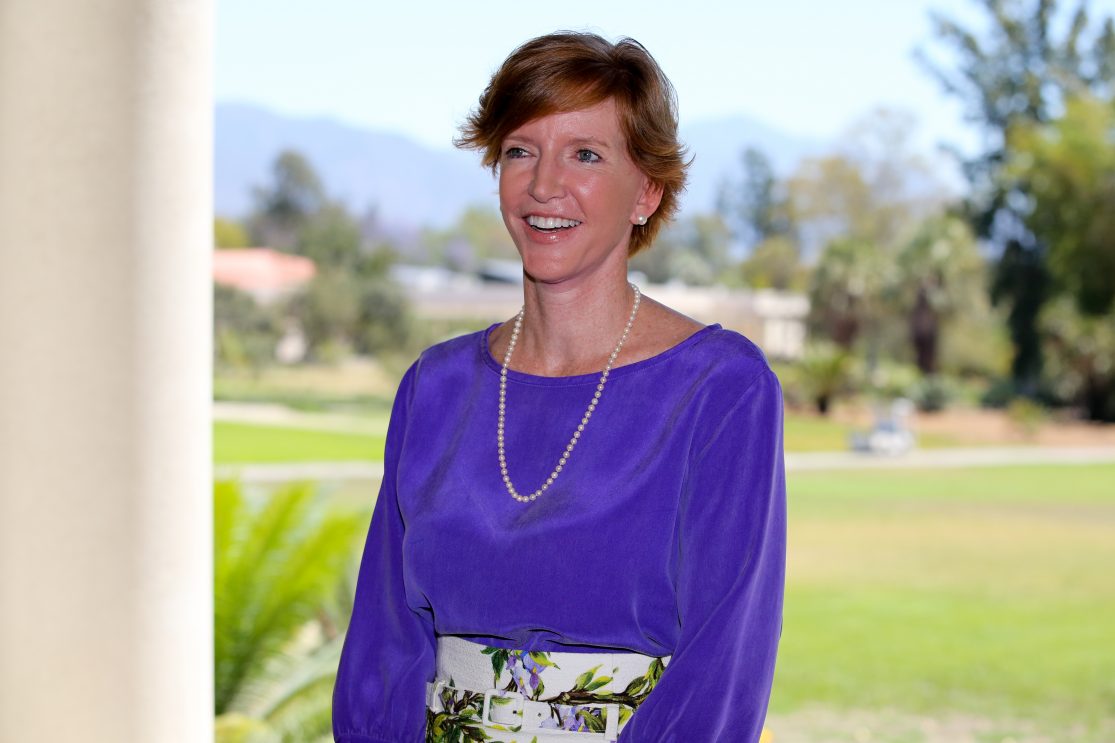Sometimes, coming full circle can signify a large measure of growth. For Dr. Laura Skandera Trombley, former Pitzer College president and noted Mark Twain historian, accepting the role of president at The Huntington Library, Art Collections, and Botanical Gardens—a private, nonprofit research institute that houses some of the finest rare books and manuscripts in existence—has no doubt produced a moment or two of déjà vu (but more on that in a moment).
With more than 9 million items in its extraordinary collection of rare books and manuscripts, The Huntington is an important center for the study of British and American literature and history, the history of the American West in particular, and the history of science. Its gorgeous grounds house botanical gardens that cover nearly two thirds of the 207-acre San Marino estate, making The Huntington a beacon for scholars, artists, and lovers of beauty everywhere.
“The Huntington speaks to everything that I love and believe in,” says Trombley. Sitting with CSQ in her tastefully adorned, sun-splashed office less than two weeks after her return, Trombley recalled spending many hours poring over Twain manuscripts and letters while still a grad student at USC.
A self-proclaimed complete and utter humanities person, the respected scholar and leader acknowledges the influence of her family’s educational bent on her career trajectory. “Both of my parents were educators. My mother was an elementary school principal; my father spent his career teaching second grade. I saw the commitment and the time it took, because they really cared about their work and the children.” Starting college at age 16 and subsequently completing her Ph.D., she soon realized her own love of teaching, which she enjoyed for 13 years before going into administration.
Prior to joining The Huntington in July, Trombley was president of Pitzer College, a residential liberal arts college in Claremont. She raised acceptance standards and increased the endowment through fundraising campaigns. She had no plans of leaving and, in fact, admits that accepting her new position was “the hardest [professional] decision I’ve ever made. I really wrestled with it, in part because [at Pitzer] I had a wonderful board of trustees that I was working with and I had an established record of success.

“For years, I used to say [leading The Huntington] is my dream job,” adds Trombley. “There is nothing that would be greater as a humanities scholar than being part of The Huntington.”
It was during her graduate research that Trombley serendipitously stumbled on 100 original letters that Twain, a prolific writer and lecturer, had written to his daughters. Initially convinced the letters were forgeries, Trombley confirmed their authenticity when she travelled to meet with the retired stamp collector who had purchased the letters at an LA antique shop for $100. Twain’s only surviving child had moved to Hollywood, and the happy stamp collector was thrilled to learn that these letters—7 of which were previously unknown to exist—were worth upwards of half a million dollars when auctioned to a private collector in the 1980s. So inspired was Trombley by the cache of letters that she based her dissertation—and four subsequent books—on Twain’s life. “It was kind of this remarkable, crazy way of entering this field of scholarship that I had never really even considered—kind of kismet. I think in some ways, Twain found me.” In addition to her writings (the most recent of which was Mark Twain’s Other Woman: The Hidden Story of His Final Years, published in 2011), Trombley appeared in Ken Burns’ 2002 documentary on the prolific writer and humorist and was invited to a White House literary symposium on American authors.
Established in 1919 by businessman Henry E. Huntington and his wife Arabella, the institution is known for its beautiful gardens, fantastic galleries, and libraries brimming with rare and unique historical manuscripts. In addition to scholarly pursuits, The Huntington has been the site of many first dates, first kisses, and wedding proposals. And the roses? At last tally, there were some 1,500 different varieties cohabiting the popular Rose Garden, many of which bear the names of luminaries such as Audrey Hepburn or Ronald Reagan.
The sumptuous and meticulously maintained gardens—more than a dozen in all—not only bring the LA community together; they attract specific cultures as well. Since its Chinese Garden opened in 2008, The Huntington has become a must see destination for visitors who come to Los Angeles from Asia; the garden is especially popular with Chinese dignitaries on tour.
“We have world-class laboratories, both for preserving as well as digitizing. [Yet] at a place where you have 9 million items, the question is, which ones are you going to choose?”

Photo: Neil G. Phillips
As it nears its centennial, The Huntington faces a number of challenges. One major question surrounds document digitization, which helps scholars do their life’s work, preserves rare and valuable works, and also helps educate the public. “We have world-class laboratories, both for preserving as well as digitizing rare books, manuscripts, and related rare items. [Yet] at a place where you have 9 million items, the question is, which ones are you going to choose?” she posits.
The Huntington finds beauty in scholarship, taking things that, while at one time considered unexceptional, eventually can shed light on the era and context in which they were created. For example, the library recently purchased all of the coded telegraph archives from the Civil War years, which are being translated via crowdsourcing. “I love that we’re crowdsourcing because that creates the ripple effect that there are exciting things going on here and that we’re not simply observers,” Trombley says.
As she begins her next chapter, Trombley is excited to be a voice emphasizing the relevance of the humanities in today’s era, reminding us that humanities speak to the core of who we are. While acknowledging that technology has fundamentally changed our lives, Trombley believes “technology without the questions that the humanities raise is empty and, ultimately, can be completely destructive. The two really go hand in hand. If you look at the Fortune 500, 45 percent of their CEOs either went to a liberal arts college or had liberal arts engagement while they were in college.” Trombley’s own success reinforces her point.
The Huntington stands strong as a great intellectual center, “the sine qua non of one man’s realized dream—both of what he could contribute in terms of his life legacy but also what he wanted to provide for future generations that he would never meet,” Trombley sums up. “We do extraordinary work here preserving and studying our past because that then allows us to think at a much higher level when we contemplate the future.”
As she leads The Huntington toward the century mark, Trombley plans to emphasize the genesis and meaning of the institution, which was by Henry Huntington to provide his collection of library art and botanical materials for scholarly pursuit and enjoyment by the public. Huntington, who made his fortune pioneering the railroad industry, started collecting books at a young age, assembling his first private library by age 21. Due to his desire to surround himself with beauty, he also started to collect art early on in his life.
“I want people to know about us, how this place came to be and why, as well as tell the story of Henry Huntington. This was something that in no way happened by chance or by accident,” she says. “Creating The Huntington was absolutely the fulfillment of his lifelong dream,” she says. Trombley’s poise and confidence leave little doubt that The Huntington is moving forward in the best possible hands. One can’t help but think that Henry and Arabella would be pleased.














































